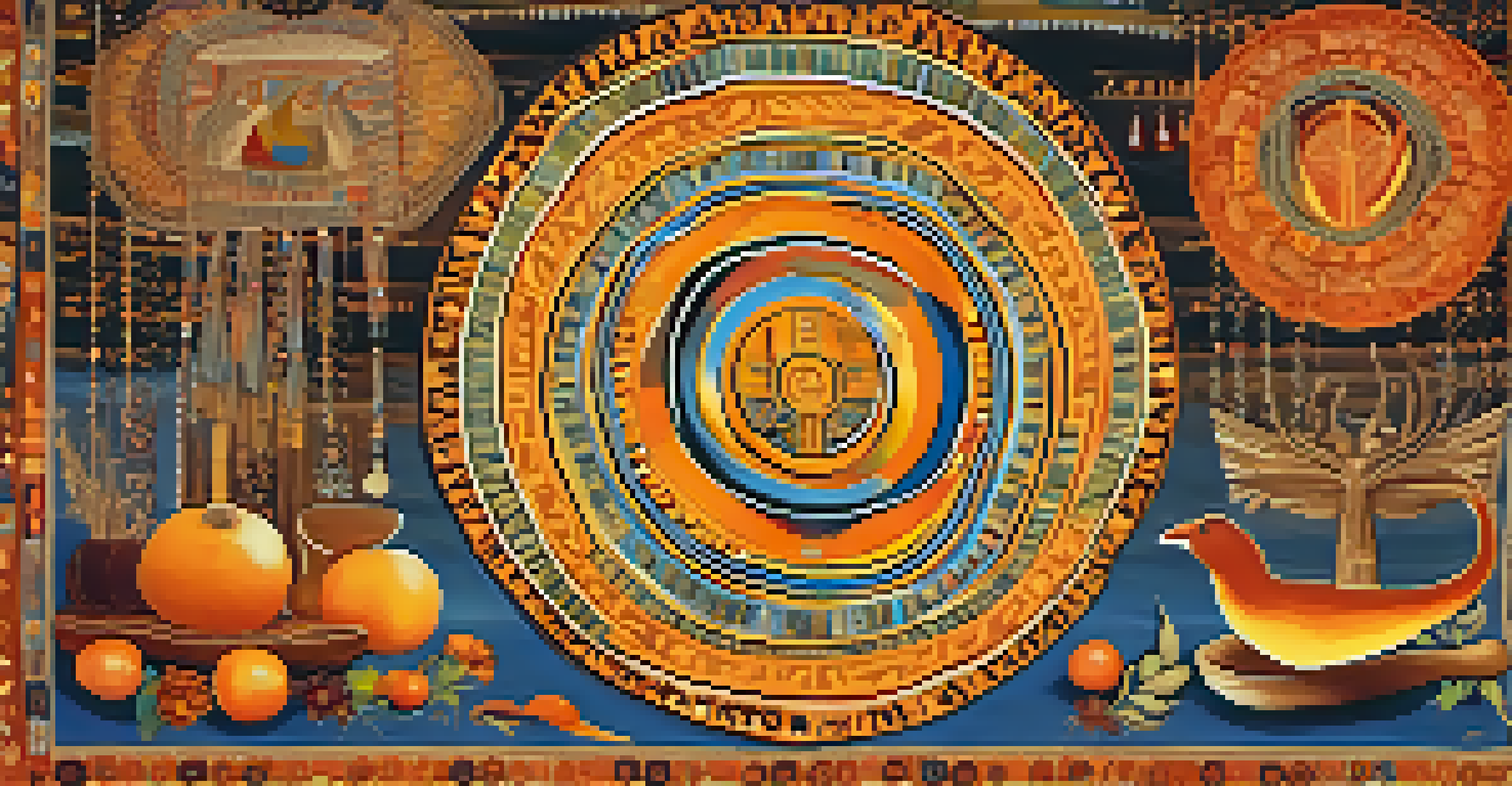Spirituality and Identity: Narratives in Postcolonial Literature

Understanding Postcolonial Literature and Its Themes
Postcolonial literature emerges from the historical contexts of colonization, grappling with themes of identity, culture, and belonging. Writers from formerly colonized regions often explore the duality of their existence, navigating between traditional values and colonial legacies. This genre isn't just about storytelling; it's a means of reclaiming voices that were suppressed and reshaping narratives that define cultural identity.
The past is never dead. It's not even past.
The complexity of identity in postcolonial literature often reflects the struggle of individuals to reconcile their heritage with the influences of colonization. These narratives frequently highlight how spirituality intertwines with cultural identity, showcasing the profound impact of both on personal and collective experiences. Understanding this relationship is crucial for appreciating the depth of postcolonial texts.
In essence, postcolonial literature serves as a mirror, reflecting not only the struggles of societies but also the rich tapestry of spiritual and cultural identities. By analyzing these works, readers gain insight into the multifaceted nature of identity formation in a postcolonial context. This exploration sets the stage for delving deeper into the narratives that shape our understanding of spirituality.
The Interplay of Spirituality and Identity in Narratives
Spirituality often acts as a foundation for identity in postcolonial literature, influencing characters' beliefs and actions. For many authors, spiritual practices rooted in indigenous traditions are vital for character development and plot progression. This connection illustrates how spirituality can serve as a source of strength and resilience amidst the adversities faced in a postcolonial landscape.

By weaving spirituality into their narratives, writers create a sense of belonging that transcends the trauma of colonization. Characters frequently embark on journeys of self-discovery, where they explore their spiritual roots and redefine their identities. These journeys are not just personal; they echo a collective search for meaning in a world shaped by colonial histories.
Identity in Postcolonial Literature
Postcolonial literature explores the complexity of identity, highlighting the struggle to reconcile heritage with colonial legacies.
This interplay of spirituality and identity emphasizes that understanding oneself often requires reconnecting with cultural and spiritual heritage. It highlights the importance of narrative as a means to reclaim lost identities and to express the complexities of the human experience. Through this lens, readers appreciate how spirituality becomes a vital thread in the fabric of postcolonial narratives.
Cultural Symbols and Spiritual Practices in Literature
Cultural symbols and spiritual practices play a critical role in shaping identities within postcolonial literature. Authors often use symbols like sacred spaces, rituals, and traditional beliefs to illustrate the characters' connections to their heritage. These symbols not only enrich the narrative but also serve as vehicles for exploring deeper existential questions about belonging and identity.
Language is not just a means of communication; it is a means of identity.
For instance, the use of nature as a symbol can evoke a sense of spirituality that resonates with indigenous beliefs. Characters might find solace in natural landscapes, which serve as reminders of their cultural roots and spiritual connections. This relationship with nature can highlight a longing for authenticity in a world that often feels alienating.
By incorporating cultural symbols, writers also challenge colonial narratives that sought to erase indigenous identities. This reclamation of symbols reinforces the idea that spirituality and identity are intertwined, allowing characters to assert their uniqueness in a postcolonial context. These elements contribute to a richer understanding of how identity is constructed and expressed in literature.
Personal Narratives and the Search for Identity
Personal narratives in postcolonial literature are often reflective of broader societal struggles, particularly in the quest for identity. Authors craft stories that delve into their characters' internal conflicts, revealing how colonial histories shape their sense of self. This intimate portrayal of identity struggles resonates with readers, fostering empathy and understanding.
Characters frequently embark on journeys that mirror the complexities of cultural identity. Their experiences might include grappling with the legacies of colonialism, navigating cultural expectations, or discovering personal spirituality. Such narratives not only highlight individual resilience but also emphasize the importance of community in shaping one's identity.
Spirituality Shapes Identity
Spirituality acts as a foundation for identity, offering strength and resilience as characters navigate their cultural roots.
These personal stories illustrate the profound impact of history on individual lives, demonstrating that identity is never static but constantly evolving. The search for identity becomes a universal theme, enabling readers to connect with the characters on a deeper level. Ultimately, these narratives remind us that our identities are shaped by both personal experiences and collective histories.
The Role of Memory in Shaping Identity
Memory serves as a powerful tool in postcolonial literature, shaping characters' identities and their understanding of spirituality. By reflecting on past experiences, characters often confront the traumas of colonization and the cultural legacies they inherit. This exploration of memory allows for a deeper understanding of how identity is constructed and deconstructed over time.
Authors frequently utilize flashbacks and recollections to illustrate the complexities of memory in relation to identity. These narrative techniques create a tapestry of experiences that highlight the interplay between personal and collective memories. Readers witness how characters navigate their pasts to forge their identities and reclaim their spiritual connections.
Moreover, memory is depicted as both a burden and a source of strength. While it can evoke pain and loss, it also serves as a reminder of resilience and cultural continuity. This duality emphasizes that spirituality and identity are often shaped by our recollections, making memory an essential theme in understanding postcolonial narratives.
The Impact of Language on Identity Formation
Language plays a crucial role in shaping identity in postcolonial literature, serving as both a tool of expression and a barrier. Many authors explore the relationship between language and culture, highlighting how colonial languages can create a sense of dislocation. This tension between languages often reflects characters' struggles to define their identities and assert their spirituality.
Incorporating indigenous languages into narratives allows authors to reclaim cultural identities and challenge colonial dominance. Characters who navigate multilingual environments often find their identities shaped by their ability to switch between languages, each carrying its own cultural weight. This linguistic fluidity illustrates the complexities of identity in a postcolonial context.
Memory's Role in Identity Formation
Memory serves as a powerful tool in shaping identity, allowing characters to confront their past and reclaim their spiritual connections.
Ultimately, language becomes a means of empowerment, enabling characters to articulate their experiences and beliefs. It serves as a reminder that identity is not solely fixed but can evolve through language and expression. By examining the impact of language, readers gain a more nuanced understanding of how identity and spirituality intersect in postcolonial literature.
Conclusion: The Significance of Spirituality in Identity
In conclusion, the exploration of spirituality and identity within postcolonial literature reveals a rich tapestry of narratives that resonate with readers. These stories highlight the complexities of identity formation, showcasing how cultural, spiritual, and historical elements intertwine. By examining these themes, we gain insight into the struggles and triumphs of individuals navigating a postcolonial world.
The significance of spirituality in shaping identity cannot be overstated; it serves as a grounding force that connects individuals to their heritage and community. Through the lens of postcolonial literature, readers are invited to reflect on their own identities and the spiritual narratives that inform them. This journey toward understanding fosters empathy and appreciation for diverse experiences.

Ultimately, postcolonial literature acts as a powerful vehicle for reclaiming identities and asserting cultural narratives. It encourages readers to engage with their spiritual journeys, recognizing the importance of understanding one's past to forge a meaningful future. As we delve into these narratives, we not only celebrate the richness of diversity but also acknowledge the shared human experience of seeking identity and belonging.